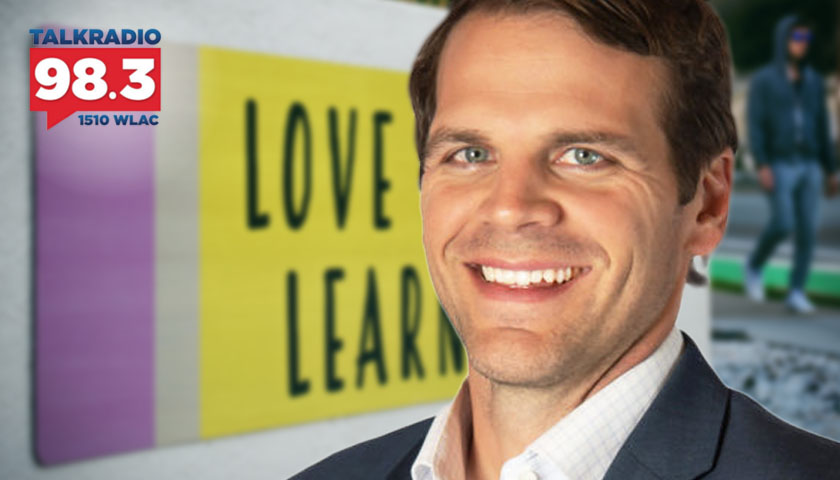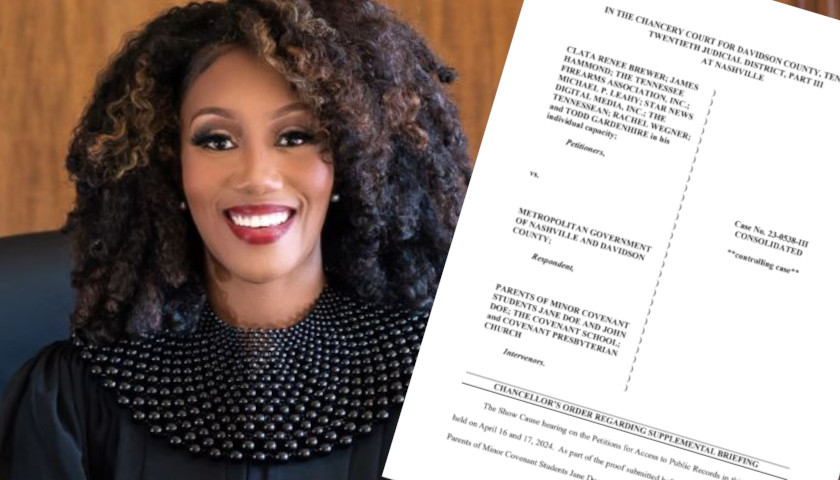Live from Music Row Friday morning on The Tennessee Star Report with Michael Patrick Leahy – broadcast on Nashville’s Talk Radio 98.3 and 1510 WLAC weekdays from 5:00 a.m. to 8:00 a.m. – host Leahy welcomed the new state director for the American Federation for Children John Patton to the newsmaker line to explain his background, new role, and legislative goals.
Leahy: We welcome to our newsmaker line, new friend John Patton, the new Tennessee State Director for American Federation for Children. Welcome, John. Good morning.
Patton: Michael Patrick, thank you so much, so much for having me on. It’s very good to be with you this morning.
Leahy: We’re delighted to have you on the program. And of course, our good friend Shaka Mitchell has, I think, changed roles with AFC. Now he’s the strategy director and you’re the state director. Do I have that right?
Patton: Yes, sir. That’s correct. Shaka, he’s moved on up. He’s working with a number of our teams across multiple states across the country. And now I am here focused on Tennessee.
Leahy: As a strategy director he’s not focused just on Tennessee. He’s working with a number of states.
Patton: Yes, sir. That’s correct. Yes. And he’s around and available and has been a great help to me. But he is definitely helping AFC across the country in many ways.
Leahy: Let’s talk about you, John Patton. You’re a native of Nashville. You have an interesting background. You have a master of divinity from Covenant Theological Seminary, but you also have an MBA from Washington University in St. Louis. Tell us a little bit about your background and that unusual combination.
Patton: Yes, sir. Great question. I attended Covenant Seminary in St. Louis. And once upon a time I was aiming for the pastorate and I actually worked for a denomination for about six or seven years.
I’m still in that denomination of the church. But I pivoted away for a number of reasons. I did have four children of my own in quick succession and so jumped over to the private sector to apply my trade there and really enjoyed it in a lot of ways.
But when I talked to Shaka and met him about a year ago and we started having some conversations, the work that AFC was doing and combined with my own experience of my children in various school systems in Missouri and Tennessee, it was sort of an opportunity I couldn’t resist.
Especially as you know, and as your audience knows, this is a pretty incredible inflection point in the history of education in America for these last two years.
Leahy: What’s the difference between being a student at a theological seminary and in a master’s in a business program? What’s the difference between those two experiences?
Patton: I will say the former is a lot more text-heavy. It’s a lot of reading. You learn Greek, you learn Hebrew, you read and you write a whole lot. And in business school, it’s lots of group projects.
Obviously, it’s lots of spreadsheets and numbers. So I’d say to boil it down, that’s probably the biggest difference between the two.
Leahy: Now tell us what the agenda is for the American Federation for Children here in Tennessee now that you’re the state director in Tennessee?
Patton: Yes, sir. There are two bills that we’re excited about right now. One is a lot of folks don’t know, there’s currently a school choice program in Tennessee that was passed in 2015 called the IEA. And it’s an ESA for students with special needs.
Leahy: So now hold it. This is like too much MBA stuff. You got to break these acronyms down for our audience. (Laughter) IEA and ESA. What do those stand for?
Patton: The ESA is kind of the blanket term for, they used to be called vouchers. The ESAs are actually different than vouchers in that it’s a sum of money that families who qualify, can use it for private school.
They can use it for tutors, for home school, for micro-schools or pods, which have become kind of a big thing. And so that’s sort of the blanket term.
Leahy: It’s that educational savings account. Is that what it is? ESA?
Patton: Yes, sir. That’s correct.
Leahy: And what was that IEA thing that you’re talking about?
Patton: IEA is the Individualized Education Account, which is a rather generic name. What it is is an ESA but for students with special needs. Ok. And so that program currently exists. It has existed since 2015.
Leahy: So what would be a special need?
Patton: Special needs, there are deaf-blind disorders, there are kids that would qualify the kind of on the autism spectrum.
Leahy: I have a special need for you. Are you ready?
Patton: Yes, sir.
Leahy: Learning how to read and write. (Chuckles) That’s a special need.
Patton: Yes, sir.
Leahy: Well, it’s a joke. I’m just kidding.
Patton: It’s a good joke, but it actually leads perfectly into our first bill, a bill that we’re putting forward is to expand this IEA program, this special needs program, to include dyslexia and dyslexic disorders, which currently it does not.
There are many thousands of children in Tennessee that could benefit from such a program. So that’s one. That’s the first we’re trying to expand.
Leahy: Who’s carrying that bill and what are its prospects of passing?
Patton: The prospects of passing, I would say are good. So on the House side, we’ve got Representative Deborah Moody. And on the Senate side, we are still locking it down.
Looks like it’s probably likely to be Senator Ferrell Haile. So we are going to file that here before the deadline, which is, I guess, sometime next week.
Leahy: So you’re cautiously optimistic about that bill that would extend the IEA program to dyslexic students?
Patton: Yes, sir. That’s correct.
Leahy: You have another bill on the agenda?
Patton: And we do have another one. We have an ESA bill.
Leahy: Educational Savings Account.
Patton: Yes, sir. And this ESA bill going forward will allow parents in school districts that don’t offer a full year of school days, 180 days of in-person learning due to COVID. It will allow them to access an ESA. And the clock on that would start this coming fall.
Leahy: Wouldn’t that apply to any student in Metro Nashville Public Schools, right?
Patton: Yes, sir. Except it’s not retroactive. The clock on that would start this fall. So it’s sort of a deterrent.
Leahy: The clock starts this fall, but people wouldn’t be able to act on it until the following fall. Is that right?
Patton: Or the following semester. So if Metro Nashville or Shelby County were to shut down for a couple of weeks this coming fall, Then every student in that district could potentially access those funds.
Leahy: And who’s carrying that bill?
Patton: That’s Senator Mike Bell.
Leahy: Oh, yeah. Retiring state Senator Mike Bell. He’s a good guy. He was in studio here just a little bit ago and then on our newsmaker line.
Patton: Yes, he’s a fantastic guy. So that’s Senate Bill 1674. And then on the house side, it’s Michael Curcio and it’s House Bill 1671.
Leahy: Right. They’ve talked about that. Those are two powerhouses. That bill, I would say would have a pretty decent chance of passing. Is that what you see?
Patton: We’re working hard. We’re trying to get it moved out of the subcommittee and upon up to bring it to a vote. We’re working hard. Again, cautiously optimistic there.
Leahy: Will the governor sign the bill if it passes both Houses?
Patton: I would believe so. Yes, sir.
Leahy: Got it.
Patton: Tell us a little bit about what your job is like. What do you do every day? Do you get up and go down to the Tennessee General Assembly and walk around and talk to the various state legislators? What’s your typical day like, John?
Patton: In this new year, it’s been a lot of what you just said. It’s a lot of going down to the Capitol meeting with legislators. It’s meeting with our coalition partners, folks like The Beacon Center and Tennessee Can and coordinating our efforts in communications and sending various communications to our email list, staying active on social media and basically just trying to build and keep up a coalition of parents and of folks that are interested in this issue.
And can see that for the last two years. The problems were there before but the last two years have exposed and laid bare the depth of the problem. We’re trying to keep those folks activated and interested and it’s easier than it’s ever been. I can say that.
Leahy: John Patton, the newly named Tennessee State Director for American Federation for Children, thanks so much for joining us. Come in studio sometime.
– – –
Tune in weekdays from 5:00 – 8:00 a.m. to the Tennessee Star Report with Michael Patrick Leahy on Talk Radio 98.3 FM WLAC 1510. Listen online at iHeart Radio.
Photo “John Patton” by American Federation for Foundation.









Anyone else tiring of hearing how the state bureaucrats continually dream up special reasons for spending more money on education? I would get rid of this group tomorrow.